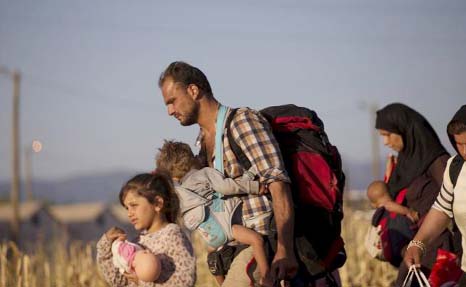
Reuters, Vienna/Munich :Austria said on Sunday it planned to end emergency measures that have allowed thousands of refugees stranded in Hungary into Austria and Germany since Saturday and move step by step “towards normality”.Austria had suspended its random border checks after photographs of a Syrian toddler lying dead on a Turkish beach showed Europeans the horror faced by those desperate enough to travel illegally into the heart of Europe, which is deeply divided over how to cope.After 71 people suffocated in the back of a truck abandoned on an Austrian highway en route from Hungary, and as thousands headed from Budapest towards Austria on foot, Vienna had agreed with Germany to waive rules requiring refugees to register an asylum claim in the first EU country they reach.Austrian Chancellor Werner Faymann said that decision was being revised following “intensive talks” with German Chancellor Angela Merkel and a telephone call with Hungarian Prime Minister Viktor Orban, bitterly opposed to the waiver.”We have always said this is an emergency situation in which we must act quickly and humanely. We have helped more than 12,000 people in an acute situation,” Faymann said.”Now we have to move step by step away from emergency measures towards normality, in conformity with the law and dignity.”Hungary laid on over 100 buses to the border on Saturday night after Austria said it had agreed to the emergency measures, to the relief of thousands of migrants and refugees stranded in Budapest after travelling through the Balkans and Greece, many of them fleeing civil war in Syria.Others set off from a station to make the 170-km (110-mile) journey on foot. A platforms filled up again on Sunday.Germany has said it expects to receive 800,000 refugees and migrants this year, and urged other EU members to open their doors. It decided to free up additional three billion euros ($3.35 billion) for federal states and municipalities to help cope with the influx, a joint statement by the ruling coalition said.At the station in Munich, state capital of Bavaria, a few dozen well-wishers turned up to cheer the new arrivals. Those who stopped to speak told of weeks of arduous travel by land and sea. Some seemed intimidated by the welcoming applause.The president of the Upper Bavarian government, Christoph Hillenbrand, said he expected 13,000 migrants to reach the city on Sunday, up from a previous estimate of 11,000, following 6,800 arrivals on Saturday. Hillenbrand, adding that 11,000 could arrive on Monday, said Munich was running out of capacity.Authorities there were using a disused car showroom and a railway logistics centre as makeshift camps, and were adding a further 1,000 beds to 2,300 already set up at the city’s international trade fair ground. About 4,000 people were sent to other German states.”It’s getting tight,” Hillenbrand told reporters at the train station.Merkel’s decision to allow the influx has caused a rift in her conservative bloc, with her Bavarian allies saying she had pushed ahead without consulting the federal state administrations dealing with the problem on the ground.The political rift is greater across Europe, with Hungary’s Orban accusing Berlin of encouraging the influx.”As long as Austria and Germany don’t say clearly that they won’t take in any more migrants, several million new immigrants will come to Europe,” he told Austrian broadcaster ORF.

